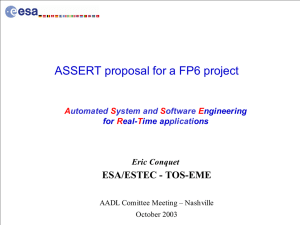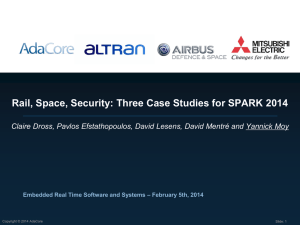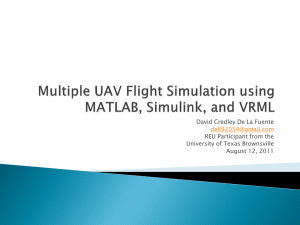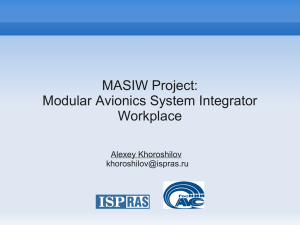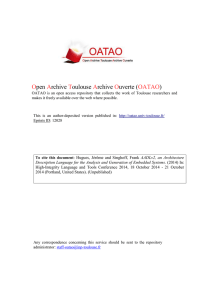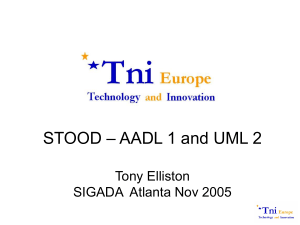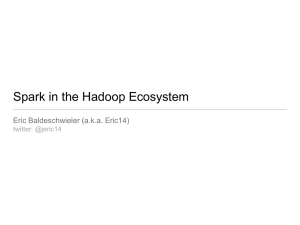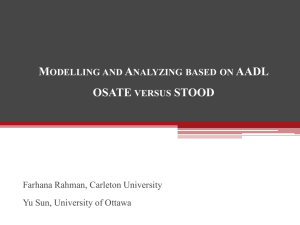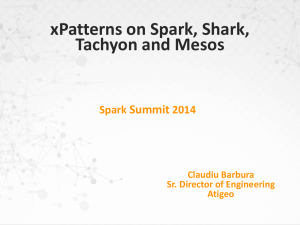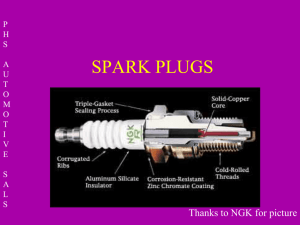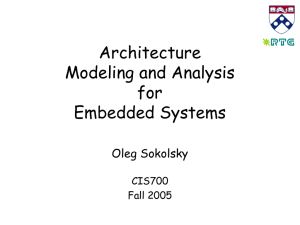System to Software Integrity: A Case Study Slides
advertisement
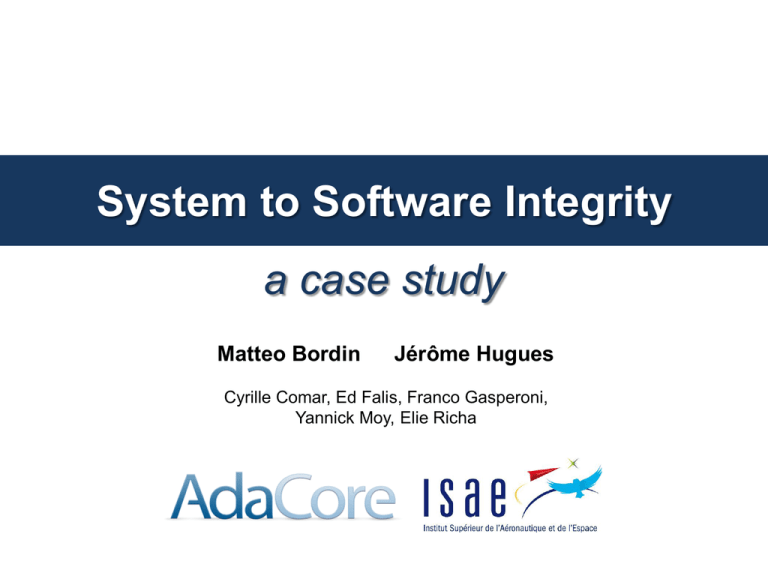
System to Software Integrity
a case study
Matteo Bordin
Jérôme Hugues
Cyrille Comar, Ed Falis, Franco Gasperoni,
Yannick Moy, Elie Richa
How to verify property preservation?
Peer review
Design/Verify-by-contract
Testing
Reverse engineering
(Eiffel, Ada 2012, SPARK, Frama-C,
…)
Automatic code generators
How to combine them?
What about system properties?
a case study
The nose gear challenge
The ground velocity shall be available iff the data used
for computation is no older than 3000ms
The measured velocity shall not differ of more than 3
Km/h from the real velocity during the latest 3000ms
From System to Software (top-down only)
AADL
System Model
Property 1
…
Property 2
Property N
Decompositi
on
SPARK
2014 1
Property
Simulink
Property 2
Property N
Code
Generation
SPARK
2014 2
Property
Property N
From AADL to Simulink and SPARK
• Take advantage of AADL mechanisms to
– Describe execution and communication resources (threads, ports, …)
– Bind Simulink or Ada functional models to threads as subprograms
thread implementation Rotation_Sensor_Sim.Impl
subcomponents
calls seq : { C : subprogram Rotation_Sim; };
connections
parameter Simulated_Velocity
-> C.Simulated_Velocity;
port C.Click -> Rotation_Click;
end Rotation_Sensor_Sim.Impl;
subprogram Rotation_Sim
features
Simulated_Velocity : in parameter Velocity;
Click : out event port;
properties
Source_Name => "Rotation_Sim.Rotation_Sim";
Source_Language => (Ada95);
end Rotation_Sim;
• First level of V&V done at model-level
–
–
–
–
Interface are correctly typed, behavior correctly defined as subprograms
Compliance to Ravenscar profile: deterministic concurrency
Schedulability analysis
Consistency: WCET of ISR handlers compatible with # of interrupts
From AADL to SPARK
• AADL provides full description of use of runtime resources
– Use Ocarina to generate code from architectural description
– Based on archetypes for concurrency, communication
• Ada/SPARK compliant, path to high-integrity software
–
–
–
–
–
#5: strong typing, generic, native support for concurrency
Compiler checks
#4: restriction for HI systems
100% OK
#3: restrictions for concurrency: Ravenscar profile
#2: well-known coding patterns
Best practice
#1: contracts: pre/post conditions
Theorem proving, 90%, on-going
• Functional code integrated as external Ada libraries
– Preserve abstraction boundaries (typing, encapsulation)
– Then connect to integration V&V activities
From Simulink to SPARK 2014
Model-level verification
(proof + simulation)
...
if Compare_To_Constant_out1 = estimatedGroundVelocityIsAvailable then
Relational_Operator_out1 := True;
Source-level proof or
else
property preservation
Relational_Operator_out1 := False;
end if;
pragma Assert (Relational_Operator_out1);
...
Run-time monitoring
of safety properties
The wrap-up
AADL
System Model
Property 1
Property 2
…
Property N
Decompositi
on
SPARK
2014 1
Property
Simulink
Property 2
Property N
Verification by
formal proof
Code
Generation
SPARK
2014 2
Property
Property N
Verification
by formal
proof
Verification
by
simulation
TA K E H O M E
messages
Property preservation: how?
• Several different techniques
– Peer review, testing, automatic code generation, formal proof, …
• How to combine them?
– While providing evidence of coverage
– And taking into account system-level concerns
• Use AADL as a pivot representation
– Derive formalized specifications downstream
• Rely on languages supporting design-by-contract
– AADL, SPARK, Simulink Assertion Blocks, …
– And translate them across abstraction layers
Current state & future improvements
• SPARK 2014 Formal Verification Toolset
– Currently in Beta, first release in April 2014
• Simulink to SPARK 2014 code generator
– Project P, available in Q4 2014
• AADL to Ada/SPARK2014 code generator + runtime
– Part of Ocarina distribution, available through http://www.openaadl.org
– Tested with GNATProve GPL 2013
Cyrille Comar, AdaCore
thanks!
Matteo Bordin, bordin@adacore.com
Jérôme Hugues, jerome.hugues@isae.fr
Ed Falis, AdaCore
Franco Gasperoni, AdaCore
Yannick Moy, AdaCore
Elie Richa, AdaCore
